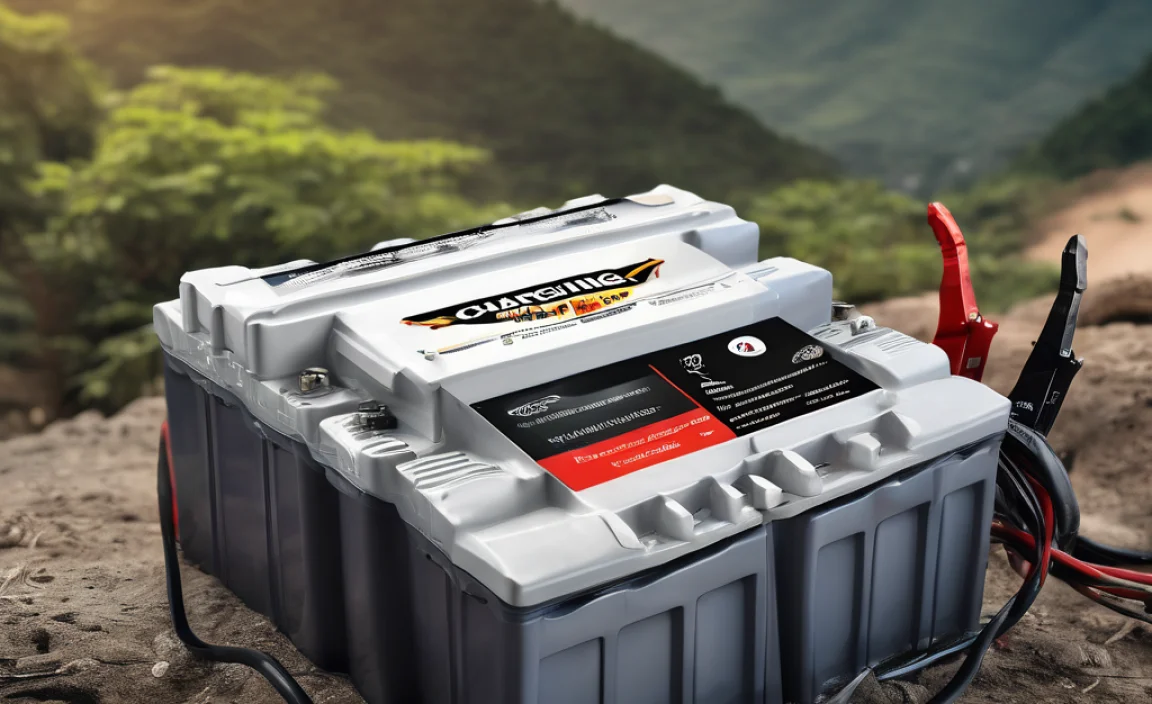Business Battery Recycling: A Quick Guide for Businesses
Recycling batteries for your business is crucial for environmental safety and compliance. Learn how to correctly dispose of various battery types, find local recycling options, and understand the benefits. This guide makes responsible battery disposal simple and effective for any business.
Hey everyone, Roy Walker here! Dealing with dead batteries in your business can feel like a small hassle, but it’s a really important one. Think about your laptops, company cars, backup power systems, or even just the remote controls in the break room. They all use batteries, and when they die, they can’t just go in the regular trash. Why? Because batteries contain chemicals that can harm our planet if they end up in landfills. They can leak into the soil and water, which is bad news for everyone. Plus, many areas have rules about how businesses should handle battery waste. But don’t worry! This guide is here to make battery recycling for businesses easy to understand and follow. We’ll walk through exactly what you need to do, step-by-step, so you can keep your business running smoothly and responsibly. We’ll cover everything from identifying battery types to finding the best recycling spots and understanding why it all matters.
Why Battery Recycling Matters for Your Business
Recycling batteries isn’t just a good idea; for businesses, it’s often a necessity. It helps protect the environment, keeps you on the right side of the law, and can even save you money. Let’s break down why this is so important for any company, big or small.
Environmental Protection
Batteries, especially older types, contain heavy metals like lead, mercury, cadmium, and nickel. When these batteries end up in landfills, these toxic substances can leach out. This contaminated fluid, called leachate, can seep into the groundwater, polluting our drinking water and harming ecosystems. Recycling ensures that these harmful materials are properly handled and don’t escape into the environment. Metals and plastics from batteries can also be recovered and reused, reducing the need to mine for new raw materials, which is another major environmental win.
Legal Compliance and Avoiding Fines
Many states and local governments have specific regulations regarding the disposal of hazardous waste, and batteries often fall into this category. Businesses are typically held to a higher standard than individuals when it comes to waste management. Improper disposal can lead to hefty fines, legal trouble, and damage to your company’s reputation. By setting up a proper battery recycling program, you ensure your business is compliant with all relevant environmental laws and avoid costly penalties.
Resource Conservation
Batteries are packed with valuable materials. For example, lithium-ion batteries, common in electronics, contain cobalt and lithium. Lead-acid batteries, used in cars, are almost entirely recyclable. When we recycle batteries, we recover these valuable resources. This reduces the demand for virgin materials, which conserves natural resources and cuts down on the energy-intensive processes required for mining and manufacturing new components. It’s a key part of a circular economy, where materials are used and reused as much as possible.
Safety in the Workplace
Improperly stored or discarded batteries can pose safety risks within a business. Damaged or leaking batteries can cause burns or fires, especially in storage areas or during waste collection. Implementing a clear battery recycling process ensures that old batteries are handled safely, reducing the risk of accidents and protecting your employees and property. Many battery types can also explode or catch fire if punctured and short-circuited, highlighting the importance of careful handling and disposal.
Understanding Different Types of Business Batteries
Businesses use a wide range of batteries, each with its own disposal requirements. Knowing what you’re dealing with is the first step to recycling them correctly. Let’s look at the most common types you’ll find.
Alkaline Batteries (AA, AAA, C, D, 9V)
These are the most common batteries found in everyday devices like remote controls, wireless mice, keyboards, and small electronics. In many places, alkaline batteries are considered non-hazardous and can be disposed of in regular trash. However, recycling them is still the best practice to recover materials and prevent any potential environmental impact. Check your local regulations, as some areas still require them to be recycled.
Rechargeable Batteries
This category includes Nickel Cadmium (Ni-Cd), Nickel Metal Hydride (Ni-MH), and Lithium-ion (Li-ion) batteries. These are found in laptops, smartphones, power tools, digital cameras, and many other portable devices. Because they contain heavier metals or more complex chemistries, rechargeable batteries are generally considered hazardous and MUST be recycled. Never throw these in the regular trash or recycling bin. Look for specific battery recycling programs or drop-off locations.
Button Cell Batteries
These small, coin-shaped batteries are used in watches, calculators, hearing aids, and some small medical devices. They often contain mercury or silver, which are hazardous materials. Button cell batteries should always be recycled through designated programs or hazardous waste facilities because of their toxic components.
Lead-Acid Batteries
Primarily found in vehicles (car, truck, forklift batteries) and backup power systems (like those for uninterruptible power supplies or UPS), these are large and heavy. Lead-acid batteries are highly recyclable – in fact, over 99% of their components can be reused. They are also classified as hazardous waste due to their sulfuric acid content and lead. It’s illegal in most places to throw them in the trash, and there are usually buy-back or recycling programs available, often at the point of purchase or from specialized recyclers.
Specialty Batteries
This includes batteries for specific industrial equipment, medical devices, or high-drain applications. These can vary widely in chemistry and disposal needs. Always refer to the manufacturer’s guidelines or consult with a battery recycling specialist if you’re unsure.
Creating a Business Battery Recycling Program: A Step-by-Step Guide
Setting up an effective battery recycling program for your business doesn’t have to be complicated. A well-planned program ensures employees know what to do, keeps waste streams separate, and makes responsible disposal easy.
Step 1: Assess Your Battery Waste
Start by identifying the types and quantities of batteries your business typically uses and discards. Walk through different departments: IT for laptops and devices, operations for forklifts or backup power, and administrative areas for general office electronics. This will help you understand what kind of recycling solutions you’ll need.
Step 2: Educate Your Employees
A successful program relies on everyone participating. Clearly communicate the recycling policy. Explain why it’s important, which batteries need to be recycled, and how to properly store them before pickup. Use posters, emails, and brief training sessions. Make it easy for them to find the right collection bins.
Step 3: Set Up Collection Points
Designate specific, well-marked collection areas for different types of batteries. For smaller rechargeable batteries, a central bin in a common area or a designated spot in each department works well. Larger batteries, like car batteries, might need a separate, secure outdoor location. Ensure bins are non-conductive if possible and clearly labeled with the types of batteries accepted. For safety, avoid storing large quantities of batteries together, especially if there’s a risk of short circuits. Learn more about safe battery storage at the U.S. Environmental Protection Agency (EPA) website.
Step 4: Secure Appropriate Storage
For batteries awaiting collection, proper storage is key.
Prevent Short Circuits: Tape the terminals of lithium-ion and other rechargeable batteries to prevent accidental contact and potential fires.
Ventilation: Store batteries in a well-ventilated area, away from heat sources and flammable materials.
Containment: Use sturdy, sealed containers to prevent leaks from damaging the storage area or other materials.
Segregation: Keep different chemistries separate if possible. For lead-acid batteries, store them upright and in a safe, contained area to prevent acid leaks.
Quantity Limits: Be aware of any local regulations regarding the maximum quantity of hazardous waste (like certain types of batteries) you can store on-site before needing to arrange for disposal.
Step 5: Find a Reputable Recycling Partner
This is a crucial step. You need a service that is licensed and experienced in handling battery waste.
Local Municipalities and Waste Management Services: Your local government or waste hauler might offer battery recycling services or can point you to approved facilities.
Specialized Battery Recyclers: Companies focus solely on battery recycling. They often handle all types and offer pickup services.
Retailer Take-Back Programs: Many electronics stores and auto parts stores accept old rechargeable batteries and lead-acid batteries for recycling, sometimes offering a small credit.
Call2Recycle: This is a prominent battery stewardship program in North America that partners with many businesses and municipalities. You can find drop-off locations and information on their website.
When choosing a partner, ask about their handling procedures, certification, and any documentation they provide for your records. For example, many businesses need a certificate of disposal for compliance.
Step 6: Schedule Regular Pickups or Drop-offs
Based on the volume of batteries you generate, set up a schedule for your recycling partner to pick up the collected batteries. If you’re using drop-off points, make sure you have a plan for transporting them regularly to the recycling facility. Don’t let collected batteries pile up indefinitely, as this can create storage and safety issues.
Step 7: Track Your Recycling Efforts
Keep records of your battery recycling activities. This includes the amount of batteries recycled (by weight or number), the dates of pickup, and receipts or certificates from your recycling provider. This documentation is important for compliance, for internal reporting, and for demonstrating your company’s commitment to sustainability.
Battery Recycling Options for Businesses
Finding the right place to recycle your business’s batteries is key. Thankfully, there are several reliable avenues you can explore to ensure responsible disposal.
Local Government and Waste Management Services
Your city or county’s waste management department is often the first and best place to inquire. They can provide information on:
Designated household hazardous waste (HHW) drop-off sites that may accept business waste, sometimes with specific limitations or fees.
Scheduled bulk waste pickups that might include batteries.
Listings of licensed commercial waste haulers who handle hazardous materials.
Local ordinances and regulations related to battery disposal for businesses.
You can usually find this information on your local government’s official website or by calling their public works department.
Commercial Battery Recyclers
These companies specialize in collecting and processing various types of batteries from businesses. They offer a comprehensive solution, often including:
Regular scheduled pickups.
Containers and bins for safe storage.
Certificates of recycling for compliance.
Services for a wide range of battery chemistries, from small electronics to large industrial batteries.
Searching online for “commercial battery recycling [your city/state]” will yield local providers. Ensure they are certified and have good reviews.
Retailer Take-Back Programs
Many retailers that sell electronics or automotive products offer battery recycling programs. These are particularly good for rechargeable batteries and sometimes lead-acid batteries. You can often drop off old batteries at:
Electronics stores (e.g., Best Buy often partners with Call2Recycle).
Hardware stores.
Automotive parts stores.
Office supply stores.
While many of these are geared towards consumers, inquire if they accept batteries from small businesses. Call2Recycle is a major program that supports collection sites for rechargeable batteries, and their website has a locator tool.
B2B (Business-to-Business) Recycling Services
Some companies focus specifically on providing recycling services to other businesses. These services might be more tailored to industrial needs, handling larger volumes or specialized battery types. They often come with a service fee but provide a convenient and compliant solution.
Manufacturer and Producer Responsibility Programs
In some regions, laws require battery manufacturers to manage the end-of-life recycling of their products. These programs, often called Extended Producer Responsibility (EPR), might involve collection networks or fund recycling efforts. Stay informed about EPR laws in your operating area, as they can dictate how you must handle certain battery types.
Safety Tips for Handling and Storing Business Batteries
When dealing with batteries, especially in a commercial setting, safety is paramount. Mishandling can lead to fires, chemical burns, and environmental contamination. Here are essential safety tips for your business.
Preventing Short Circuits
This is the most critical safety aspect, particularly with lithium-ion and other rechargeable batteries. A short circuit occurs when the positive and negative terminals come into contact, generating heat and potentially causing a fire or explosion.
Tape Terminals: Always tape the terminals of any battery that could be at risk of shorting before storing or transporting it. Clear packing tape or non-conductive electrical tape works well.
Individual Packaging: If possible, store batteries in their original packaging or in individual protective cases.
Non-Metallic Containers: Use plastic or cardboard containers for collection, not metal ones.
Safe Storage Conditions
Where and how you store batteries before they are recycled significantly impacts safety.
Cool, Dry Place: Store batteries in a cool, dry environment, away from direct sunlight, heat sources, or flammable materials. High temperatures can accelerate degradation and increase risk.
Well-Ventilated Area: Ensure the storage area is well-ventilated to prevent the buildup of any gases that might be released by a leaking or damaged battery.
Upright for Lead-Acid: Lead-acid batteries contain corrosive acid. Store them upright to minimize the risk of leaks. Secondary containment (like a specially designed tray) is recommended if storing multiple lead-acid batteries.
Away from Water: Keep batteries away from water sources or areas prone to moisture, as this can also contribute to degradation or corrosion.
Handling Damaged or Leaking Batteries
If you encounter a battery that is swollen, leaking, corroding, or damaged, handle it with extreme care.
Personal Protective Equipment (PPE): Wear gloves (chemical-resistant if possible), safety glasses, and potentially a mask.
Containment: Immediately place the damaged battery in a sturdy, sealable plastic bag or leak-proof container to prevent further leakage.
Isolation: Isolate the damaged battery from other batteries and flammable materials.
Immediate Disposal: Arrange for its prompt removal by a specialized hazardous waste handler or battery recycler. Do not let damaged batteries accumulate.
Fire Prevention and Emergency Preparedness
Recognize that batteries, especially lithium-ion, can pose a fire risk.
No Smoking/Open Flames: Prohibit smoking or open flames in areas where batteries are stored or handled.
Fire Extinguishers: Have appropriate fire extinguishers readily available. For lithium-ion battery fires, Class D extinguishers are often recommended, but a general ABC extinguisher can be useful for other materials that might ignite. It’s best to consult with your local fire department for specific recommendations.
Emergency Plan: Include battery storage and handling in your business’s overall emergency preparedness plan. Ensure employees know what to do in case of a fire or spill.
Employee Training
Regular training for staff handling batteries is essential. They should understand:
The different battery types and their risks.
The correct procedure for taping terminals.
Where to find designated collection bins.
How to identify and manage damaged batteries.
Emergency procedures.
Resources from organizations like the Occupational Safety and Health Administration (OSHA) can provide guidance on workplace safety standards for hazardous materials.
The Benefits of Implementing a Battery Recycling Program
Beyond just environmental and legal compliance, a robust battery recycling program offers tangible benefits to your business that can impact your bottom line and reputation.
Enhanced Brand Image and Corporate Social Responsibility (CSR)
In today’s market, consumers and partners increasingly favor businesses that demonstrate a strong commitment to sustainability. Implementing a visible and effective battery recycling program showcases your company’s dedication to environmental stewardship and responsible practices. This can:
Attract environmentally conscious customers.
Improve employee morale and pride in their workplace.
Differentiate your business from competitors.
Strengthen your brand’s reputation as a responsible corporate citizen.
Many companies now highlight their sustainability initiatives, and battery recycling is a practical, achievable part of that effort.
Potential Cost Savings
While there might be initial costs for setting up bins or paying for recycling services, a good program can lead to cost savings in several ways:
Avoiding Fines: The most direct saving comes from preventing costly fines associated with improper waste disposal.
Reduced Waste Disposal Fees: By diverting batteries from general waste, you might reduce the overall volume of trash your business generates, potentially lowering your waste hauling bills.
* Resource Recovery: Although businesses typically don’t directly profit from selling recycled batteries, supporting a system that recovers valuable materials contributes to a more efficient economy, which indirectly benefits all businesses.
Employee Engagement and Safety
A clear and accessible battery recycling program can boost employee engagement. When employees see that their company cares about environmental issues and provides the means to participate, it fosters a sense of shared purpose. Furthermore, by training employees on safe handling and storage, you significantly reduce the risk of workplace accidents, creating



